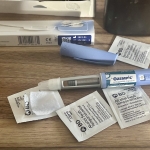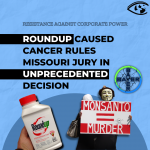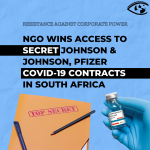USA: Pharmaceutical Company Whistle-Blower Tells of 'Illegal' Tactics
David Franklin, the drug company whistle-blower who has sparked federal and state investigations into the marketing of the top-selling drug Neurontin, said yesterday that he and his former colleagues engaged in a series of inappropriate tactics, including misleading doctors to persuade them to prescribe the drug for unapproved uses.
"I was trained to do things and did things that were blatantly illegal," Franklin, 41, said during an interview at the Boston office of his attorney, Thomas Greene. "I knew my job was to falsely gain physicians' trust and trade on my graduate degree. If he was a cardiologist, I was an expert in cardiology. If he was a neurologist I was an expert in neurology."
Franklin spent just four months working as a medical liaison for Parke-Davis, the company that sold Neurontin and was later acquired by Pfizer Inc. in 2000. Over the short period, he grew uncomfortable with the aggressive sales tactics even though he felt the rest of the drug industry was doing the same thing, Franklin said. He ended up quitting after a drive down Massachusetts Avenue in Cambridge with two top company executives, who he said told him to get with the program or find another job. Later, when he told one of them on the phone he was leaving, the executive threatened him, saying, "I can't guarantee what is going to happen to you or your career," Franklin said.
Franklin, who now directs market research at the medical device company Boston Scientific in Natick, didn't give newspaper interviews until yesterday. He said he decided to speak to reporters because requests were becoming overwhelming and he wanted to put the case behind him.
Pfizer executives yesterday declined to comment on Franklin's allegations or the investigations. "We don't believe there were untrue statements made about the product," Pfizer spokeswoman Mariann Caprino said. She noted that the allegations occurred during the mid-1990s, years before Pfizer purchased Parke-Davis, and said that "at no time has Pfizer ever condoned the promotion of products off-label."
Settlement negotiations between the federal government, the states, and Pfizer, are underway, according to court documents. At issue is whether state Medicaid programs for the poor spent millions of dollars on Neurontin for unapproved and inappropriate uses, and whether the federal and state governments can negotiate with Pfizer to repay the money. In Massachusetts alone, Medicaid spending on Neurontin grew from $1.1 million in 1996 to $14.1 million in 2000, the height of the Parke-Davis marketing campaign.
As a whistle-blower in a so-called false claims case, Franklin could be entitled to 15 to 25 percent of civil awards in the case. That could make him a millionaire many times over and put him in a growing line of whistle-blowers who have won substantial sums for bringing lawsuits against hospitals, pharmaceutical makers, and other health care companies about alleged illegal activities they witnessed as employees.
Last year, the US Department of Justice recovered $1.2 billion in civil damages under the false claim act, of which healthcare awards were the vast majority. Whistle-blowers received $160 million of the total. And the largest such award in history -- $77 million -- went to Douglas Durand, a former executive at TAP Pharmaceuticals who first brought to light how his employer conspired with doctors to overbill government insurers for the prostate cancer drug Lupron. A second whistle-blower lawsuit against TAP, filed by Dr. Joseph Gerstein and Tufts Health Plan, netted them $17 million.
Franklin was hired by Parke-Davis in April 1996 under a liaisons program started the previous year. Company executives were worried, he said, that doctors did not find sales people credible enough and they wanted to send employees with scientific degrees into physicians' offices to sell their medications. Franklin has a doctorate in biological science.
Franklin said he and a sales representative drove to doctors' offices in Massachusetts, armed with spreadsheets listing the busiest physicians. Inside the offices, the sales representative introduced him as "Dr. Franklin" to "win the doctor's trust," he said.
From there, Franklin said, it was his job to convince physicians that they should use Neurontin -- a top-selling anticonvulsant approved only as an add-on therapy for epilepsy -- to treat a wide range of conditions, including bipolar illness, for which it had not been approved by federal regulators. Doctors routinely prescribe drugs for unapproved uses. But manufacturers are not allowed to market medications for so-called "off-label" uses, a law designed to protect patients from drugs that haven't been tested extensively for safety and effectiveness for particular conditions.
"I'd tell them we had physicians across the county, some involved in clinical trials, and others who had hundreds of patients on Neurontin, all getting an extraordinary response rate," Franklin said. "We'd make them think everyone was using it but them."
During training sessions, he said, managers explained how to "enable" a physician to prescribe Neurontin for off-label uses by suggesting specific doses, and how to "close" the doctor by asking him to put his next patient with bipolar illness or some other condition on Neurontin.Franklin said Parke-Davis executives believed representatives at other pharmaceutical companies engaged in similar practices. "We weren't on par with them in terms of the size of our sales force," he said. "But there was a belief that much of what we were doing was typical. We were driving 60 miles per hour in a 55 mile per hour zone. Everyone did it." Originally, Franklin said this belief kept him going on the job. But over the next few weeks, he said, he came to believe patients could be harmed because they were being switched off other medications for seizures, bipolar illness, or other conditions, and onto Neurontin, which generally was considered safe but may not have been as effective. "I had seen evidence that the drug didn't work for bipolar, and we were taking people who were moderately controlled on another drug and experimenting with Neurontin," he said. "We were gambling with people's lives."
Many doctors say they consider Neurontin safe but that it has not turned out to be helpful in most cases of bipolar illness, also called manic-depressive illness.
After the car ride down Massachusetts Avenue, during which the executives planned to visit a doctor at the Massachusetts Institute of Technology, Franklin said, he decided to quit. "It became clear to me there was no appetite to discuss the issues and that nothing was going to change," he said.
Three weeks later, in a telephone conversation with Philip Magistro, then associate medical director of the company's Northeast customer business unit, Franklin said, Magistro recommended he quit quietly or the company would scapegoat him or ruin his career. Magistro, reached yesterday at his new employer, the generic drug company Purepac Pharmaceutical in New Jersey, declined to comment.
Franklin filed the lawsuit in August 1996 in US District Court in Boston; it was unsealed a year ago. Hundreds of pages of internal company memos, voice-mail messages, and records on individual physicians are part of the lawsuit, detailing the company's marketing strategy, including ghost-writing journal articles for doctors and rewarding the largest potential prescribers with seaside trips.
Pfizer disclosed the federal investigation and Franklin's lawsuit in its 2001 annual report, stating that criminal charges and fines could be sought as a result. Caprino would not comment on whether Pfizer expects to pay a substantial civil or criminal fine or whether the case could have a material financial impact on the company.
Franklin said yesterday he was ashamed of his participation in off-label marketing. "My wife and I haven't allowed ourselves to think about the money," he said. "We haven't built plans for our careers on that. The lawsuit allowed me to fulfill my civic obligation and report this activity."
###
- 122 Pharmaceuticals



